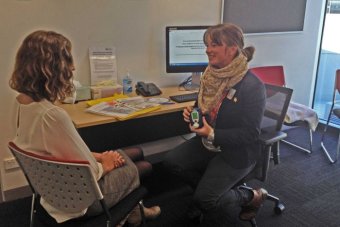A Launceston researcher is investigating whether incentives can help pregnant women stop smoking.
Dr Mai Frandsen from the University of Tasmania’s health faculty is recruiting expectant mothers aged 16 and over who have smoked in the past week and want to stop.
Dr Frandsen said the women who participate in the research will be contacted each month to see how their efforts were going, and would be rewarded for success.
“Every month that they come and see me that they’ve quit smoking, I’m going to give them a $50 shopping voucher, as a reward for quitting,” she said.
Dr Frandsen said researchers in the UK had discovered that giving women incentives to stop smoking could be cheaper than fixing health problems later on.
“Regardless of how much you’re paying these women in incentives, you end up with a net benefit of around $3,000 at the end of the day.
“So this is reducing the impact of the intensive neonatal care you might have, or ongoing respiratory issues, behaviour problems, that are associated with smoking during pregnancy.”
Regardless of how much you’re paying these women in incentives, you end up with a net benefit of around $3000 at the end of the day
Researcher Dr Mai Frandsen
Dr Frandsen said she would check on the progress of study participants one year after they had given birth to find out if they had remained non-smokers.
“What we know is that around 80 to 90 per cent of women relapse to smoking, they pick smoking back up, once their baby is born,” she said.
She said the incentive-based approach was about helping women to take the initiative to make healthy choices.
“The onus is on them. I’m providing an external motivation, and the idea is that they internalise that motivation with a little help, with a little motivation from us in the study, and they quit smoking,” Dr Frandsen said.
“Our hope is that in the coming years we can really reduce the rate of smoking in pregnancy and provide a smoke-free start for every Tasmanian baby.”
Dr Frandsen is the recipient of a three-year joint Cancer Council and University of Tasmania Research Fellowship.
The University of Tasmania has provided $20,000 to pay for the “Supporting Expectant Women to Quit Smoking Study”.
Dr Frandsen is currently recruiting women in the Launceston area but hopes to extend the study to the north-west and southern Tasmania by August.
Above-average pregnancy smoking rates in Tasmania
Research by the National Health Authority found between 2009 and 2012 about 22 per cent of pregnant Tasmanian women smoked, compared with a national average of 14 per cent.
According to the Cancer Council, 35.7 per cent of pregnant women aged below 20 smoked, while the rate was about one-in-three for expectant mothers aged 20 to 24.
Dr Julia Walters, a senior research fellow at the University of Tasmania’s Centre of Research Excellence for Chronic Respiratory Disease and Lung Ageing, has counselled hundreds of pregnant women on the dangers of smoking.
The facts on smoking while pregnant:
- About 22 per cent of pregnant Tasmanian women smoked between 2009-2012, compared with a national average of 14 per cent
- 35.7 per cent of pregnant women aged below 20 smoked, while the rate is about one-in-three for expectant mothers aged 20 to 24
- Babies of mothers who smoke are at greater risk of asthma, respiratory illness, and poor lung development
- Babies of mothers who smoke are at greater risk of SIDS, and they are more likely to become smokers themselves
- The effects of nicotine withdrawal can also be observed in newborns, with a change in alertness, in spontaneous mobility, and in newborn reflexes
“There’s a higher rate for the mother of pregnancy complications and emergencies, miscarriage, low birth weight babies and pre-term babies,” she said.
“Babies of mothers who smoke are at greater risk of, for example, asthma, respiratory illness, poor lung development, they’re at greater risk of SIDS, and they’re more likely to become smokers themselves.”
Dr Walters said the effects of nicotine withdrawal could also be observed in newborns.
“With a change in alertness, in spontaneous mobility, in newborn reflexes, and these gradually decrease over five days.”
Dr Walters said there were indications that incentive-based quit smoking programs could be more effective than simply warning smokers of adverse health outcomes.
“Arousing fear without giving people the necessary tools to change behaviour can lead to [a] defensive reaction, and rejection of the fear arousing message,” she said.
“There is evidence from research that financial incentives can change behaviours, and so this particular study in pregnancy is very promising.”

